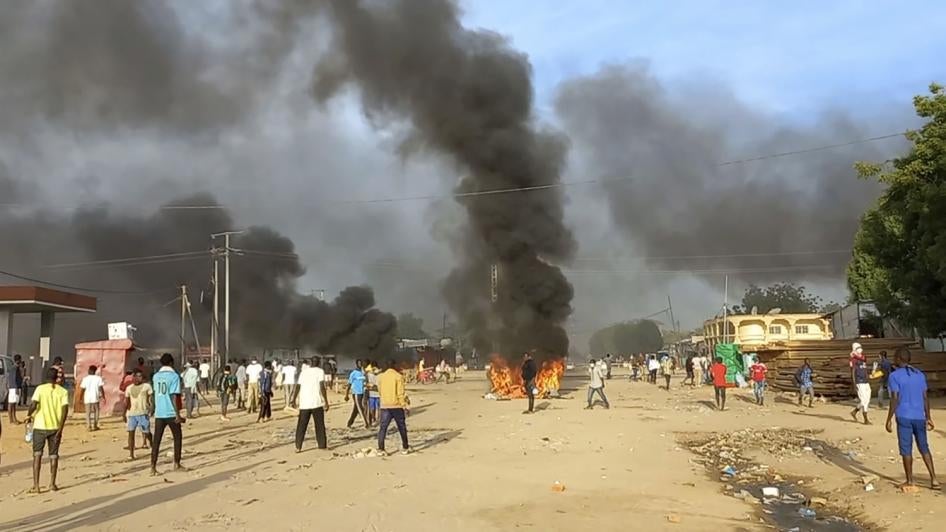(Nairobi) – Chadian authorities have failed to carry out prompt, effective, and independent criminal investigations into serious human rights violations linked to massive protests across the country on October 20, 2022, and to hold those found responsible to account, Human Rights Watch said today.
Security forces fired live ammunition at protesters, killed and injured scores, and beat and chased people into their homes. Hundreds of men and boys were arrested, and many were taken to Koro Toro, a high security prison 600 kilometers away from N’Djamena, the country’s capital. Several detainees died en route, some due to lack of water. At Koro Toro, protesters suffered further abuse, including torture and ill-treatment by other detainees. The detainees were held for months and eventually released or pardoned.
“The violence against protesters a year ago was disproportionate and unjustified, leaving scores dead and wounded, and hundreds detained in inhuman conditions at Koro Toro prison without access to lawyers or family,” said Carine Kaneza Nantulya, deputy Africa director at Human Rights Watch. “The failure of the authorities to carry out independent investigations leaves many to question whether anyone will ever be held accountable for the lives lost and the abuse and harm the protesters suffered.”
After the death of President Idriss Déby Itno on April 20, 2021, a transitional military council (Conseil militaire de transition, CMT) headed by his son, Mahamat Idriss Déby, took power in Chad and, after months of protests, promised to restore civilian rule by October 20, 2022.
In a report released in February 2023, the National Human Rights Commission (Commission nationale des droits de l'homme, CNDH) said that 128 people were killed and 518 injured on October 20, 2022, a date many people call “black Thursday” or “jeudi noir” in French. The commission found that security forces “systematically violated several fundamental human rights … [using] disproportionated means” to quell the protests. The commission asked several questions to the government, including why no judicial investigations had been opened into human rights violations and made recommendations to the transitional military authorities, including prosecuting those responsible for serious abuse.
In the days following the violence, the Economic Community of Central African States (ECCAS), one of eight African Union regional economic communities, announced an investigation. Members of the investigation commission have interviewed some family members of victims and some detainees from Koro Toro. However, the commission has not reported its findings, and it is unclear whether its report will highlight the disproportionate use of force, the need for an investigation, and the government’s obligation to ensure accountability.
Before the 2022 mass mobilization, the transitional government had, on several occasions, violently suppressed protests demanding civilian democratic rule. The security forces used disproportionate force against opponents, killing some protesters, wounding dozens, and arresting more than 700 people, most of whom were eventually released.
In late 2022, the transitional government announced a proposed new constitution. After a June 2023 vote, a constitution project was adopted by 96 percent of the members of the National Transitional Council, which replaced the National Assembly when it was dissolved after Idriss Déby Itno’s death. A referendum on the constitution is scheduled for December of this year, and presidential elections for 2024.
Meanwhile, the military authorities continue to close political space. At least 72 members and supporters of Chad’s main opposition party, Les Transformateurs (the Transformers), have been detained since October 8, 2023. These arrests seem to be an attempt to limit political dissent ahead of the December constitutional referendum, Human Rights Watch said.
After the October 2022 protests, Chadian military authorities suspended Les Transformateurs, other political parties, and civil society organizations united under a coalition known as Wakit Tama (“the time has come”, in Chadian Arabic). These suspensions were lifted after three months.
Succès Masra, the president of Les Transformateurs, left the country after the protests and planned to return on October 18, 2023. He delayed his arrival after an arrest warrant charging him with a variety of crimes, including “attempted attack on constitutional order, incitement to hatred and an insurrectional uprising,” was made public.
“As the referendum approaches, Chad should choose the path of respect for fundamental rights, ensure that opposition party members and protesters can speak out, and that Chadians are able and allowed to hear them,” Kaneza Nantulya said. “The Chadian authorities should also ensure that those found most responsible for disproportionate use of force, as well as for other serious abuses committed on ‘jeudi noir’ are held to account in fair and effective trials.”








